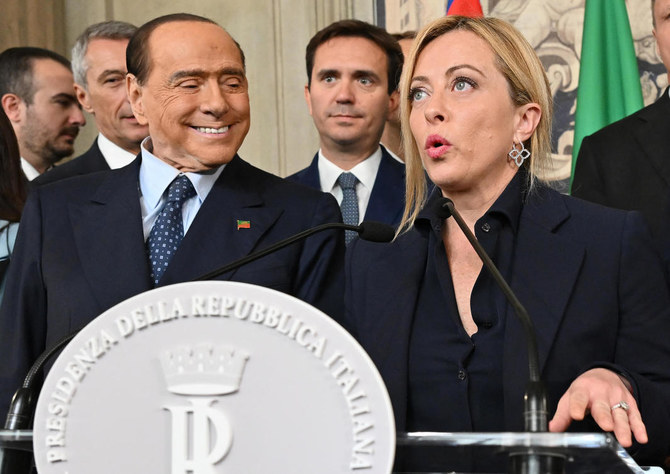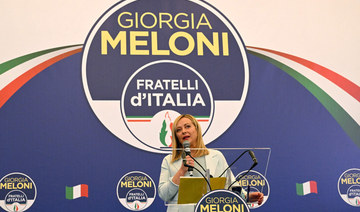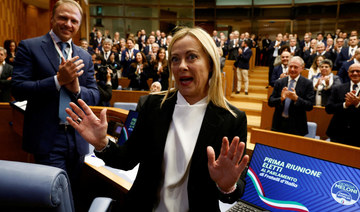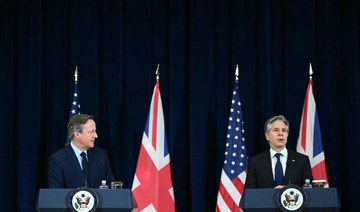ROME: Far-right leader Giorgia Meloni was named Italian prime minister on Friday, becoming the first woman to head a government in Italy.
Her post-fascist Brothers of Italy party — Euroskeptic and anti-immigration — won the September 25 legislative polls but needed outside support to form a government.
Meloni’s appointment is a historic event for the eurozone’s third largest economy and for Brothers of Italy, which has never been in government.
Shortly after she was named, the 45-year-old from Rome named her ministers, who will be sworn in on Saturday in front of President Sergio Mattarella.
Her Brothers of Italy party won 26 percent of the vote last month, compared to eight and nine percent respectively for her allies Forza Italia and the far-right League.
Her list of 24 ministers, including six women, revealed a desire to reassure Italy’s partners. She named Giancarlo Giorgetti as economy minister, who served under the previous government of Mario Draghi.
Giorgetti, a former minister of economic development, is considered one of the more moderate, pro-Europe members of Matteo Salvini’s League.
Meloni also named ex-European Parliament president Antonio Tajani, of Forza Italia, as foreign minister and deputy prime minister.
Salvini will serve as deputy prime minister and minister of infrastructure and transport.
That appointment is likely to disappoint Salvini, who wanted Meloni to give him the role of interior minister again after he previously held the post between 2018 and 2019.
The position went instead to a technocrat, Rome prefect Matteo Piantedosi.
A formal ceremony for the handover of power from Draghi to Meloni will take place on Sunday before the premier leads the first cabinet meeting.
The consultations to cobble together a government had been overshadowed by disagreements with her two would-be coalition partners over Meloni’s ardent support for Ukraine since the Russian invasion. The leaders of Forza Italia and the League are both considered close to Moscow.
A recording was leaked during the week in which Italy’s former prime minister Silvio Berlusconi — who heads Forza Italia — talks about his warm ties with Moscow and appeared to blame the war in Ukraine on Ukrainian President Volodymyr Zelensky.
Her other coalition partner, Salvini, is a long-time fan of Russian President Vladimir Putin and has criticized Western sanctions on Russia.
Despite her Euroskeptic stance, Meloni has been firm about her support for Ukraine, in line with the rest of the European Union and the United States.
“I intend to lead a government with a clear and unequivocal foreign policy line,” she has said. “Italy is fully, and with its head held high, part of Europe and the Atlantic Alliance (NATO).”
“Anyone who does not agree with this cornerstone will not be able to be part of the government, even at the cost of not forming a government,” Meloni has warned.
Berlusconi, 86, has said his personal and political positions “do not deviate from that of the Italian government (and) the European Union” on Ukraine.
But the tensions add to concerns that Meloni’s coalition, held together by the need for a parliamentary majority, will struggle to maintain unity.
Berlusconi’s allies insist his comments in the recording, from a meeting with lawmakers earlier this week, were taken out of context.
The billionaire media mogul described a rekindling of relations with long-time friend Putin, who he said sent him 20 bottles of vodka and a “very sweet letter” for his birthday.
Meloni’s coalition wants to renegotiate Italy’s portion of the EU’s post-Covid recovery fund.
It argues the almost 200 billion euros ($193 billion) it expects to receive should take into account the current energy crisis, exacerbated by Moscow’s invasion of Ukraine, which has hit supplies of Russian gas to Europe.
But the funds are tied to a series of reforms only just begun by Draghi’s government, and analysts say Meloni has limited room for maneuver.
Gilles Moec, chief economist at the Axa group, said there would be a continuation of what Draghi had been doing on the economy.
“I’m not really worried, at least not in the short term, when we are in a ‘Draghi II’ (phase) in economic matters,” he told AFP.
Meloni had campaigned on a platform of “God, country and family,” sparking fears of a regression on rights in the Catholic-majority country.
She has distanced herself from her party’s neo-fascist past — and her own, after praising dictator Benito Mussolini as a teenager — and likes to present herself as a straight-talking but unthreatening leader.
Inflation in Italy rose to 8.9 percent in September over the previous year, threatening to put the country in recession next year.
The margin for maneuver is limited given that Italy’s colossal debt represents 150 percent of gross domestic product, the highest in the eurozone after Greece.
Draghi used his last day on the European stage on Friday to warn both his fellow leaders and Meloni that a united Europe should remain their “guiding star.”
Draghi said everyone looked at “the EU as a source of security, stability and peace,” adding: “We have to keep this in mind as a guiding star for the future, especially in troubled times like these.”
Far-right Meloni named Italy’s first woman PM
https://arab.news/6gp33
Far-right Meloni named Italy’s first woman PM

- Her post-fascist Brothers of Italy party -- Eurosceptic and anti-immigration -- won the September 25 legislative polls
- Meloni's appointment is an historic event for the eurozone's third largest economy and for Brothers of Italy
OIC calls for immediate aid amid Afghan flood crisis

- Flash floods from seasonal rains in Baghlan province in northern Afghanistan
RIYADH: The Organization of Islamic Cooperation has issued an urgent appeal to its member states as well as relief organizations to provide aid to the Afghan people amid catastrophic flooding which has hit the country, Saudi Press Agency reported on Sunday.
Flash floods from seasonal rains in Baghlan province in northern Afghanistan killed at least 315 people since striking on Friday, a UN report said.
Rains also caused heavy damage in northeastern Badakhshan province and central Ghor province, officials said.
Since mid-April, floods have left about 100 people dead in 10 of Afghanistan’s provinces, with no region entirely spared, according to authorities.
Farmland has been swamped in a country where 80 percent of the more than 40 million people depend on agriculture to survive.
UK investigating Hamas’ claim that British hostage killed in Gaza

- Foreign secretary confirms viewing video
LONDON: The UK’s Foreign Office said on Sunday it was investigating a claim by Hamas that a British-Israeli hostage in Gaza had died from injuries sustained in an Israeli airstrike over a month ago.
Nadav Popplewell, 51, was captured along with his mother Channah Peri on Oct. 7 during a border incursion when the Palestinian group launched a surprise attack on Israel.
The Foreign Office said it was actively seeking more information on the matter.
Popplewell’s family has requested media outlets refrain from airing footage released by Hamas, showing him in captivity with visible injuries, the BBC reported.
The UK’s Foreign Secretary David Cameron, speaking to the BBC’s Laura Kuenssberg, confirmed viewing the video but provided no further updates on the investigation.
Cameron said: “We don’t want to say anything until we have better information.”
He described Hamas as “callous” for releasing the video and playing “with the family’s emotions in that way.”
The Foreign Office added that the department’s thoughts “are with his family at this extremely distressing time.”
The Israeli military has not issued a statement on the matter.
Israel’s military campaign in Gaza to destroy Hamas has killed over 34,900 people, the majority of whom are women and children, according to the Gaza Health Ministry.
Israel has reported that 128 hostages are unaccounted for.
UK mountaineer logs most Everest climbs by a foreigner, Nepali makes 29th ascent

- Both climbers used Southeast Ridge route to summit
- They were on separate expeditions guiding their clients
KATMANDU: A British climber and a Nepali guide have broken their own records for most climbs of Mount Everest, the world’s highest mountain, hiking officials said on Sunday.
Rakesh Gurung, director of Nepal’s Department of Tourism, said Britain’s Kenton Cool, 50, and Nepali guide Kami Rita Sherpa, 54, climbed the 8,849-meter (29,032 foot) peak for the 18th and 29th time, respectively.
They were on separate expeditions guiding their clients.
“He just keeps going and going... amazing guy!” Garrett Madison of the US-based expedition organizing company Madison Mountaineering said of the Nepali climber. Madison had teamed up with Kami Rita to climb the summits of Everest, Lhotse, and K2 in 2014.
K2, located in Pakistan, is the world’s second-highest mountain and Lhotse in Nepal is the fourth-tallest.
Lukas Furtenbach of the Austrian expedition operator Furtenbach Adventures called Cool’s feat remarkable.
“He is a fundamental part of the Everest guiding industry. Kenton Cool is an institution,” Furtenbach, who is leading an expedition from the Chinese side of Everest, told Reuters.
Both climbers used the Southeast Ridge route to the summit.
Pioneered by the first summiteers, New Zealander Sir Edmund Hillary and Sherpa Tenzing Norgay in 1953, the route remains the most popular path to the Everest summit.
Kami Rita first climbed Everest in 1994 and has done so almost every year since, except for three years when authorities closed the mountain for various reasons.
He climbed the mountain twice last year.
Mountain climbing is a major tourism activity and a source of income as well as employment for Nepal, home to eight of the world’s 14 tallest peaks, including Everest.
Nepal has issued 414 permits, each costing $11,000 to climbers for the climbing season that ends this month.
Banning UK arms exports to Israel would strengthen Hamas, UK’s Cameron says

- Cameron said he did not support an operation in Rafah in the absence of a plan to protect hundreds of thousands of civilians
LONDON: Stopping British arms sales to Israel if it launches a ground assault on Rafah in the Gaza Strip would strengthen Hamas, Britain’s Foreign Secretary David Cameron said on Sunday.
Israel ordered Palestinians to evacuate more of the southern city on Saturday in an indication it was pressing ahead with its plans for a ground attack, despite US President Joe Biden’s threat to withhold the supply of some weapons if it did so.
Cameron said he did not support an operation in Rafah in the absence of a plan to protect hundreds of thousands of civilians sheltering in the southern border city.
However, Britain was in a “completely different position” to the United States in terms of providing arms to Israel, he said, noting that the less than 1 percent of Israel’s weapons that came from Britain were already controlled by a strict licensing system.
“We could, if we chose to, make a sort of political message and say we are going to take that political step,” he told the BBC’s Laura Kuenssberg.
“The last time I was urged to do that (...), just a few days later there was a brutal attack by Iran on Israel, including 140 cruise missiles,” he added.
Cameron said the “better answer” would be for Hamas, which controls Gaza, to accept a hostage deal.
“Just to simply announce today we’re going to change our whole approach to arms exports rather than go through our careful process, it would strengthen Hamas, it would make a hostage deal less likely, I don’t think it would be the right approach,” he said.
Hamas attacked southern Israel on Oct. 7, killing some 1,200 people and taking more than 250 people hostage, according to Israeli tallies.
Israel’s military response in Gaza has killed close to 35,000 Palestinians, according to Gaza’s health ministry.
‘Completely helpless’: Afghanistan’s north struggles to get aid after deadly floods

- Thousands of houses and livestock were also wiped out by the flash floods
- Afghanistan is prone to natural disasters, considered vulnerable to climate change
KABUL: Survivors of the deadly flash floods that ripped through northern Afghanistan were still struggling without basic aid on Sunday, as the official death toll rose to over 300.
Heavy rains on Friday triggered flash floods across at least seven provinces, including Baghlan, Ghor, Badakhshan and Takhar, injuring more than 1,600 people and destroyed about 2,600 houses, according to the latest data from Afghanistan’s Ministry of Refugees.
Many people remain missing and livestock were wiped out as survivors picked through muddy, debris-littered streets and damaged buildings over the weekend, while authorities and humanitarian agencies deployed aid and rescue workers.
“All available resources are being mobilized, and relevant ministries and agencies are actively engaged in delivering urgent aid,” Mullah Abdul Ghani Baradar Akhund, Afghanistan’s deputy minister for economic affairs, told survivors in Baghlan province on Sunday, as he reassured “unwavering support” from the Taliban-led government “until their lives are restored to normalcy.”
But some people in the province, which bore the brunt of the deluges, said that aid has yet to reach them.
“We haven’t received any support from the government or aid organizations yet. Everyone comes and asks us questions, then they go back,” Ghulam Nabi, who is from the province’s Burka district, told Arab News in a phone interview.
“We lost our houses and our lives. Everything we had is under mud now. The agriculture land and livestock, our only source of livelihood, are also completely destroyed. We don’t have the basic means to cook food for ourselves.”
Since mid-April, flash flooding and other floods had left scores of people dead and destroyed farmlands across Afghanistan, a country where 80 percent of its more than 41 million people depend on agriculture to survive.
The South Asian nation is prone to natural disasters and is considered by the UN to be one of countries most vulnerable to climate change.
Aid group Save the Children said about 600,000 people, half of them children, live in the five districts in Baghlan that have been severely impacted by the recent floods.
“Lives and livelihoods have been washed away. The flash floods tore through villages, sweeping away homes and killing livestock. Children have lost everything,” Arshad Malik, the group’s country director in Afghanistan, said in a statement.
Most of the affected areas are still cut off on Sunday, inaccessible by trucks as roads and bridges were damaged by the floods, which also impacted other public infrastructure.
People were struggling to access essential health services, the World Health Organization said in a statement, as “several health facilities remain non-operational.”
Abdul Fatah Jawad, director of Ehsas Welfare and Social Services Organization, said that many of the flood survivors were still in shock.
“People are so scared and traumatized. Most houses that survived the flooding are emptied as people fear more floods. Families took refuge in school yards and deserted areas far from residential houses,” Jawad told Arab News.
He said families are in urgent need of basic goods, such as food, drinking water, medicine, tents, blankets and shelter. Since Saturday, his organization has managed to deliver cooked food for hundreds of families.
“People, particularly children, need to eat something … They also need cash to rebuild their houses and their businesses,” he said. “Some families lost everything — house, land, livestock, business. They are completely helpless.”



















